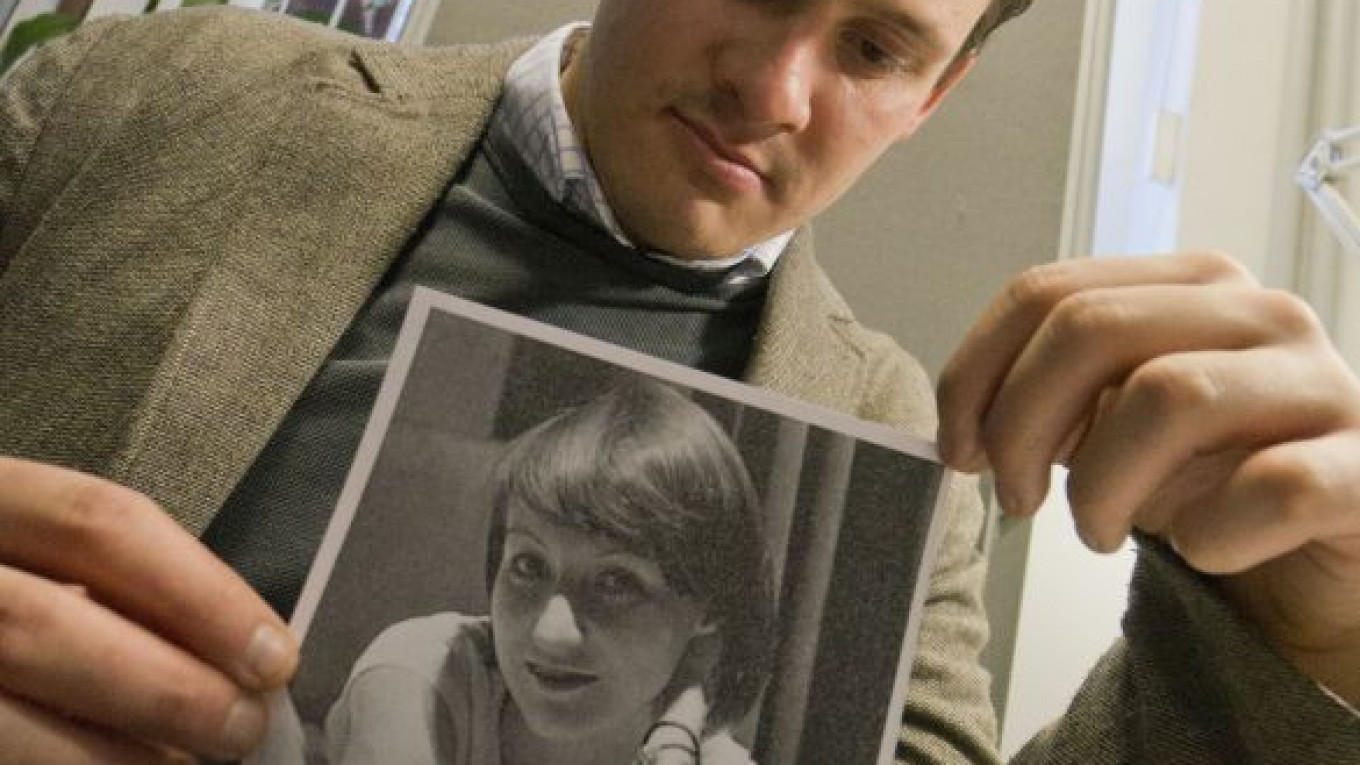James Stanton, a 30-year-old education specialist from Britain, traveled with nine Russian government officials on a bus to the small town of Uglovka, 430 kilometers northwest of Moscow, where a funeral awaited him.
The officials had collected Stanton at Sheremetyevo Airport with long faces, handshakes and sympathetic words, and he gloomily wondered why they were going through the motions when it was too late to change anything.
Stanton's Russian girlfriend, Yana Baranova, died in a fiery plane crash in Kazan last month, and her coffin was in the hold of the bus.
Stanton, who recounted the Dec. 10 bus ride in an interview, felt sad and annoyed as he watched snow-laden birches zip by the 30-seat bus. Yana Baranova's father, Andrei, who was also on the bus headed to his hometown in the Novgorod region, had to complete a substantial amount of paperwork despite being exhausted from the trauma of losing his only daughter. The authorities had been aware that Stanton, who speaks only basic Russian, planned to travel to Kazan to pick up his girlfriend's remains and accompany them to the funeral. Yet they had not provided anyone who spoke English.

James Stanton dining at a Moscow restaurant with Yana Baranova on Nov. 11, four days before the crash.
Also, the officials "looked like they weren't exactly sure why they were there," Stanton said.
But the most frustrating thing for Stanton was watching the authorities spend time and money transporting his girlfriend's coffin — efforts that he said would have been better spent on making sure that she got to her destination safely.
"When you are talking about the life of somebody you love, to hear 'I'm so sorry' from a government authority does not help," Stanton told me over a cup of tea at The Moscow Times' editorial office. Their efforts "felt very much like a big mop" to clean up the mess "and a lot of patting on the back."
With the help of Google Translate, he put this point across to a female psychologist provided by the Emergency Situations Ministry who was riding on the bus. She surprised him by replying in English, "This is Russia."
This catchphrase is readily recycled when someone complains about poor service in Russia, but on this occasion Stanton said he was exasperated that it was used to explain a disaster that killed 50 people, including the president of Tatarstan's son; a British teacher and mother of two, Donna Bull; and Yana Baranova, 26, who worked with Bull.
Baranova boarded Tatarstan Airlines Flight No. 363 bound from Moscow's Domodedovo Airport to Kazan, 720 kilometers to the east, at 6 p.m. on Sunday, Nov. 17. She was on her way to Kazan for a work trip. She and Stanton usually chatted on Skype ahead of flights, but they were not able to this time, settling instead for exchanging WhatsApp messages. Baranova was supposed to write when she landed in Kazan.
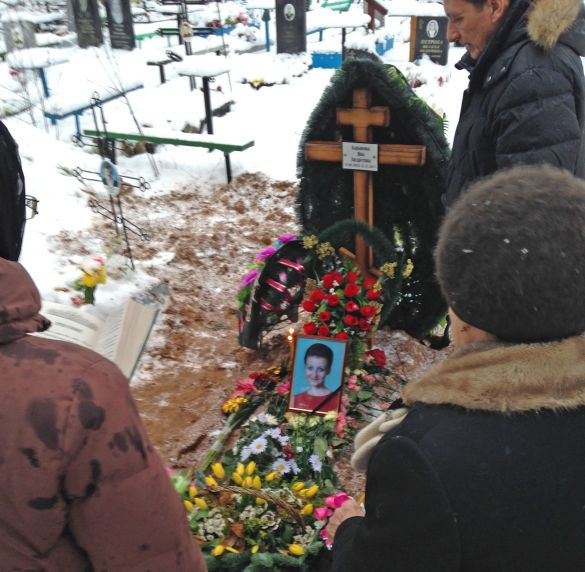
Loved ones mourning Yana Baranova at a cemetery in Uglovka last week.
About 90 minutes later, Stanton was watching the U.S. television show "Breaking Bad" on DVD in London when a Scottish friend working in Nizhny Novgorod called and asked for Baranova's flight number. He had heard about a plane crash in Kazan.
At about 7:25 p.m., the Boeing 737 carrying Baranova slammed almost vertically into the ground between the runway and a taxi strip at Kazan International Airport. Having aborted his first landing attempt, the pilot performed a maneuver at a height of 700 meters that had put the plane into a nosedive from which there was no recovery, investigators say. No one survived the crash and resulting explosion.
As the grim realization set in that it was his girlfriend's flight, Stanton's mind "flashed red."
"I panicked, and then my blood ran cold. The world just seemed to happen," Stanton said. "It seems surreal. Even now, I'm still waiting for Yana to WhatsApp me back."
How the Two Met
Stanton met Baranova at an educational fair in the Kazakh capital, Astana, in 2011. Both worked for companies that help foreign students get into British universities. The pair hit it off immediately and, even though Stanton lived in southern England and Baranova in Moscow, they maintained a long-distance relationship over the next two years, seeing each other about twice a month.
"I can remember what she was wearing and the look she gave me," Stanton said of their first meeting in Astana. "And from then on, I knew my life would be a bit different. I knew she wasn't going to turn me down; I don't know why."
Baranova was tall, with dark hair, elegant and slim. She wore a below-the-knee red skirt and a white shirt with a simple necklace at their first meeting. Two weeks later, Stanton was in Hong Kong on another business trip and he realized how smitten he was when he, cooped up in a hotel, began to long to hold Baranova.
"I still wake up every morning and just want to pull her close to me," he said.
I first met James Stanton 10 years ago while we were studying together at the same university in Scotland. A cricketer with the strapping build of a rugby player, Stanton is gregarious, outgoing and speaks with passion. He introduced me to Yana Baranova in Moscow in March of this year, and although I was only in her company for an hour, I saw enough to understand that his loss is enormous. The couple had intended to spend the rest of their lives together, most likely in Britain, and Baranova had been particularly keen on pursuing a postgraduate degree in London within the next two years.
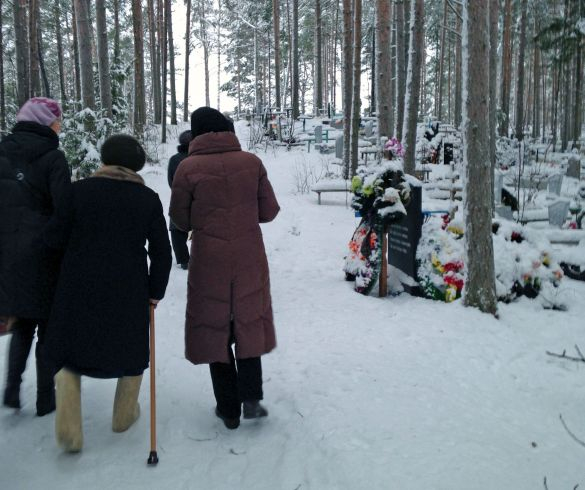
Yana Baranova's relatives walking through a snowy cemetery in Uglovka in the Novgorod region.
Stanton's knowledge of the crash has come from reading news reports. The Russian authorities have not provided him personally with an explanation. "No one contacted me from the Russian authorities," Stanton said. "Maybe if we had been married it would have been different, but we hadn't got that far, obviously."
Investigators have not been able to explain the pilot's actions. They say that the jet's two engines were running normally and that nothing unusual showed up on the flight data recorder. Blood analysis tests found that neither the pilot nor co-pilot had any traces of alcohol or illegal drugs in their systems.
The plane's two flight recorders and the tape from the voice recorder were badly damaged, so investigators' preliminary conclusions that pilot error was the cause of the crash might not change.
The possibility that the pilot made a mistake may be compounded by suspicions that he was not even properly trained. Investigators earlier this month searched the offices of the federal aviation regulator, Rosaviatsia, because they believe that an unspecified number of training centers that Rosaviatsia certified gave fake licenses to unqualified pilots. The Boeing 737's captain and the co-pilot, who had 44 years of in-flight experience between them, got their licenses at training centers that have since been shut down and are now being looked into, the Investigative Committee says.
Poor Air Safety Record
But if Stanton could pose just one question, it wouldn't be to ask who was at fault. He wants to know how much time lapsed between the moment his girlfriend started to fear that the plane would crash and it actually going down.
"It is very upsetting if you lose somebody you love and you can't be there when they are frightened or scared," Stanton said. "You want to give them your hand, and I can't explain easily how that feels."
While he recognizes that getting a better understanding of what happened will not bring Baranova back, it might provide some comfort to know that she wasn't scared for very long.
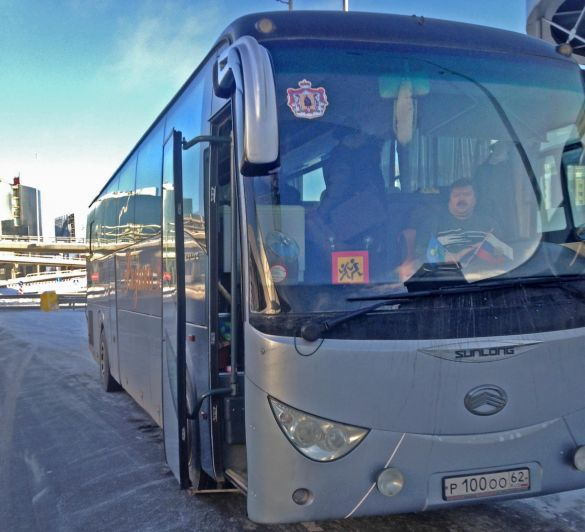
The bus that delivered James Stanton and his girlfriend's coffin to Uglovka.
Russia has an unenviable aviation safety record. Ninety-three people died in the four crashes that occurred in 2012, while in 2011 Russia had an accident rate nearly three times higher than the world average, according to data collected by the International Air Transport Association, or IATA. Only 25 airlines in Russia and the Commonwealth of Independent States, or a fraction of the dozens that are flying, have completed the IATA's safety audit. Tatarstan Airlines is one of them.
Stanton already had qualms about Baranova flying with smaller airlines based in the Russian regions and the CIS. He had flown with Kazakh operator SCAT Airlines while working in the country two years ago, and he heard alarm bells when he read that one of their planes had crashed in January, killing all 21 people on board. Stanton also used to have aspirations of becoming an air traffic controller, and he had followed some statistics relating to Russia. He had even warned his girlfriend about flying with "dodgy" airlines on a number of occasions.
Dealing With the Aftermath
After the initial shock subsided slightly, Stanton decided to come to Russia without delay. "I needed to be there. I had to say goodbye," he said. "I loved her very much, and I still do."
But Stanton was told by one of Baranova's colleagues that the crash site investigation could go on for quite some time and that he should wait a week.
He used the time to cancel the arrangements he had made for spending Christmas with Baranova in London. The Russian Embassy in London promptly issued him with a special purposes tourist visa after he gave them the necessary documentation from the British Foreign and Commonwealth Office.
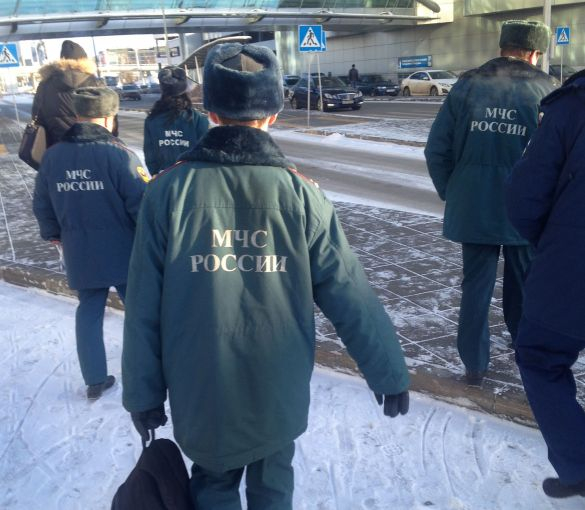
Officials from the Emergency Situations Ministry waiting at Sheremetyevo Airport for the trip to Uglovka.
He arrived in Moscow on Nov. 27 and stayed with Baranova's friends before going to Ryazan, about 200 kilometers to the southeast, where Baranova's parents live. He said they gave him a room and were extremely kind and hospitable.
Baranova's mother, Vera, is devastated by her daughter's death, but her strong Orthodox faith is pulling her through, Stanton said. Her father, Andrei, with a military background, was quite stoic about what had happened, though he did shed tears at the funeral.
Forensic investigators finished identifying all 50 victims on Dec. 6, and Stanton accompanied Andrei Baranov to Kazan a day later. They went to a morgue where belongings and pictures of items taken from the wreckage had been laid out on a table. Stanton was spared from having to identify anything that might have belonged to his girlfriend. The father handled matters because the whole process was conducted in Russian and because he was legally bound to her.
Later, a combination of gesticulation and an old dictionary allowed Stanton to help the father pick out a coffin before flying to Sheremetyevo Airport.
The Russian authorities and the airline's insurance company say they would compensate the families of the crash victims with up to 2 million rubles ($61,500) each. Baranova's parents have already received some of the money but not the full amount. Stanton is unsure whether he will get anything, but because the pair were not married, it seems unlikely.
Andrei Baranov's flight to Kazan and the bus journey from Sheremetyevo Airport to Uglovka was financed by the Emergency Situations Ministry. Stanton covered his transportation costs to and within Russia through help from his friends, his own savings and accumulated air miles.
Stanton and his girlfriend's parents have no plans to sue, believing that such a step would require inexhaustible amounts of money that they do not have. In any case, the money would not fill the gap left by Baranova's death.
Stanton traveled to Uglovka on Tuesday last week, and the funeral was held the next day.
Having heard the psychologist's explanation that "This is Russia," Stanton tried to move the conversation forward. He asked her whether she thought that Russians deserved better than a society in which people so often try to explain or excuse things by saying, "This is Russia."
"We have given up hoping," she replied.
There wasn't much point continuing after that, Stanton said.
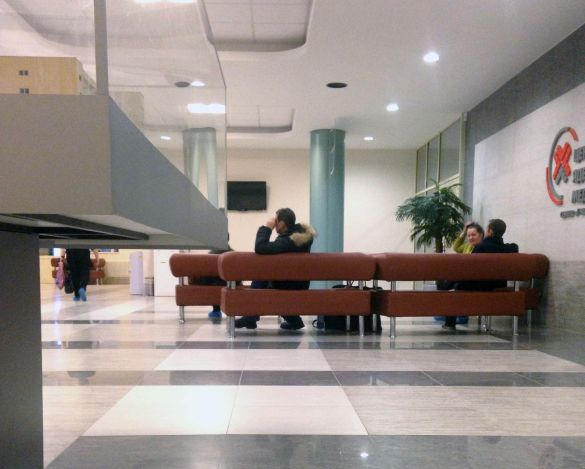
Andrei Baranov, left, waiting to identify his daughter's remains at a medical center located across the street from the morgue in Kazan.
Is Russia Hopeless?
Although James has only visited Russia seven or eight times, that attitude of hopelessness makes him despair, mainly because of the potential that he sees in Russia and the friends he has made here. He hopes that greater transparency, not only in aviation but also in business, can be achieved. But a number of his Russian friends have told him not to get his hopes up.
Suspicions that the pilots on the crashed jet lacked training raise questions as to whether Russia is a really open and fit place to do business, he said.
"First of all, it seemed like a simple pilot error, but I always think that that is an absolute cop out because any sort of accident like that is a result of systemic failure," he said. "There is no one point where someone makes a bad mistake. It is a series of mistakes that leads to the death of 50 people.
"Who are they hoping to do business with if the infrastructure is not safe, or maintained, or regulated as it should be?" he said. "Certainly in the sector of the education industry that I am involved in, this will change attitudes to working within Russia and there might be some opportunities that are not given to people as a result, and that's really terrible.
"If Russia is open for business, it has to adhere to international standards in terms of infrastructure and safety. Otherwise, Russia cannot call itself a Group of 8 country that is able to do business on that level, let alone host something like the Winter Olympics in Sochi."
As for his own life, Stanton is determined not to let his grief hold him back. He said he would be successful if he can adopt some of the ambition and drive that characterized Baranova.
He said he will remember Baranova as a motivated, well organized and single-minded career girl. In addition to short-term plans, she had five-year and 10-year plans. Each year she would make a list of New Year's resolutions and gradually go through them, crossing each one off as she completed them. His favorite resolution that he saw crossed off with red ink was "work more efficiently."
"She definitely achieved that," he said.
Contact the author at m.lammey@imedia.ru
A Message from The Moscow Times:
Dear readers,
We are facing unprecedented challenges. Russia's Prosecutor General's Office has designated The Moscow Times as an "undesirable" organization, criminalizing our work and putting our staff at risk of prosecution. This follows our earlier unjust labeling as a "foreign agent."
These actions are direct attempts to silence independent journalism in Russia. The authorities claim our work "discredits the decisions of the Russian leadership." We see things differently: we strive to provide accurate, unbiased reporting on Russia.
We, the journalists of The Moscow Times, refuse to be silenced. But to continue our work, we need your help.
Your support, no matter how small, makes a world of difference. If you can, please support us monthly starting from just $2. It's quick to set up, and every contribution makes a significant impact.
By supporting The Moscow Times, you're defending open, independent journalism in the face of repression. Thank you for standing with us.
Remind me later.


